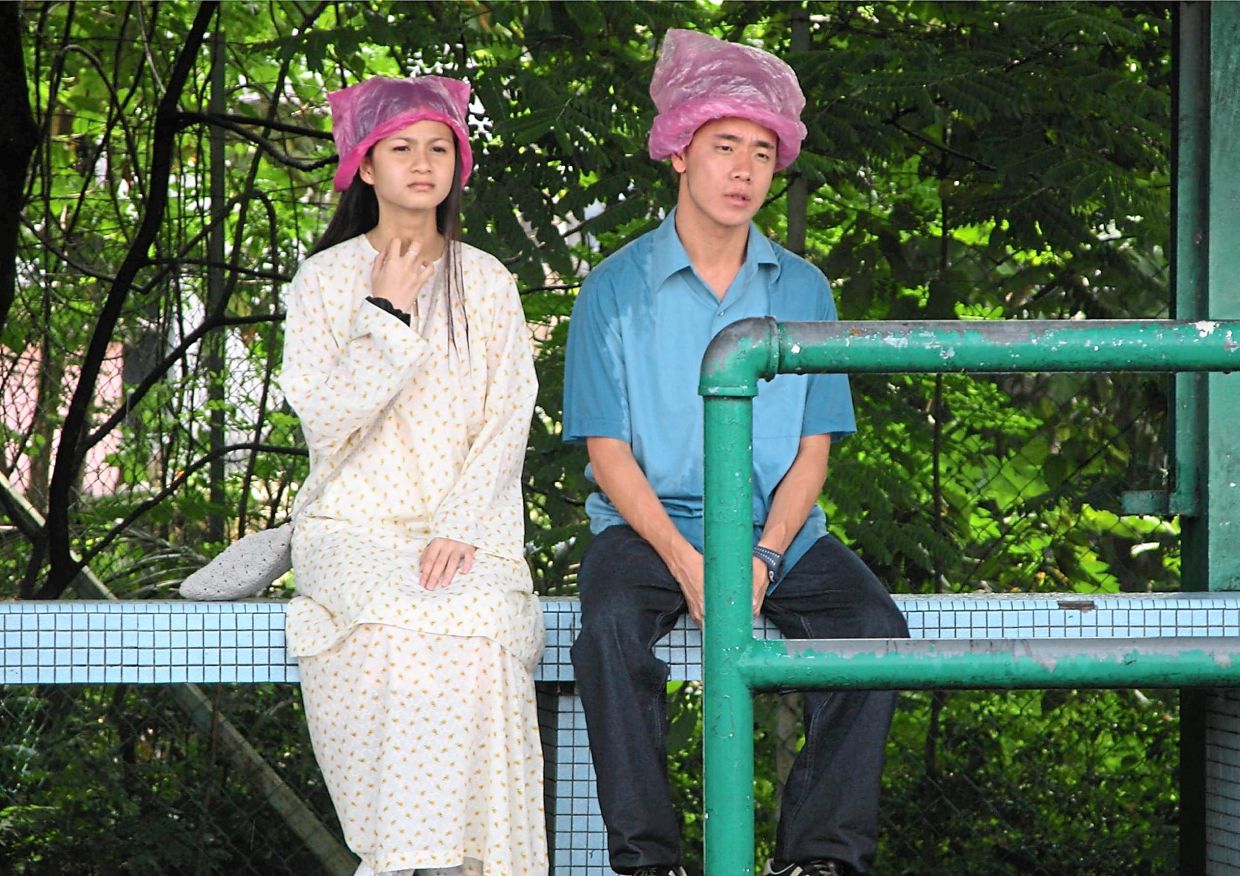IT’S so refreshing to see a Malaysian movie that’s prepared to tackle the issue of our racial and religious differences, since we have a beautifully plural society and nation. The timing of the movie is especially apt ahead of Malaysia Day next week.
The movie, Adoiii Jiwaku, revolves around three colleagues working in a hotel. Ayis, Malesh and Sia are often at loggerheads plagued by cultural differences, or rather, prejudices and ignorance.
Following an incident in which Ayis accuses Sia of siding with his Chinese colleagues, the former decides to stage an office prank, which goes horribly awry.
As a result of electric shocks, Ayis and Sia, a Malay and Chinese, swap bodies. The script is hardly reinventing the wheel, but it’s rarely done in local movies, especially if it involves two races.

Different but same: ‘Adoiii Jiwaku’ revolves around three hotel workers who are often at loggerheads due to their cultural differences. A prank gone wrong leads to a body swap between two of them, a Malay and a Chinese, and all their latent racial prejudices comically come out. — Agencies
The comical delivery proves we Malaysians can laugh at ourselves, especially when Sia – who’s now in a Malay body – makes accusations about Chinese cheats. And at home, the stereotype wick is turned up when he’s served his favourite pork-bone soup, only to spit it out angrily realising he was served the non-halal dish.
But along the way, he learns about Sia’s family, as well as the community through his experience living in a Chinese home. Ayis even ends up being able to speak Chinese (Mandarin)!
Sia, who’s now in a Malay body, ironically accuses Ayis of always being “good at cheating in businesses” as a Chinese.
Offscreen, the actor, Ali Arami, can speak Mandarin, so it came in handy for his role. Steve Yap plays Ayis while other cast members include E. Ramachandran, and guest artistes supermodel Amber Chia and the late Adibah Noor.
Unsurprisingly, plaudits for the movie have come thick and fast, with a friend, Ariff Farhan, offering his two cents by saying, “We get emotionally invested, but we will always make up. We are Malaysians after all.
“Satu jiwa, semua sama. Kalau gaduh, semua gila.” (One spirit, all the same. If we argue, we’re all crazy.)

’Adoiii Jiwaku’ film’s director Steve Yap (middle green) and executive producer Chris Daniel Wong with the cast and production crew during a recent gala night screening at TGV cinema in Pavilion Bukit Jalil, Kuala Lumpur.
The movie’s co-producer Chris Daniel Wong singled out the ace up its sleeve; “The film attempts to instil patriotism through comedy, rather than the usual genre of historic drama or war movies because the younger generation in Malaysia today is rarely moved by older patriotic films since they can’t relate to events that happened before they were even born.”
He added that despite our political alliances and cultural differences, Malaysia’s sense of unity has ultimately always prevailed.
The movie was completed in 2021 but its release was put on ice since cinema attendance was still low, with Malaysians still adjusting in the post-Covid period. Cinemas are now packed again, though.
I’m glad that the movie, which marks Yap’s directorial debut, is opportunely being screened now.
As we celebrate our National Day and soon Malaysia Day, most of us would instinctively recall the works of the late iconic Yasmin Ahmad, with her brilliant Merdeka short films as well as her movies which always portray Malaysians coming together.
It’s people like her who have done more for nation building than our politicians who continue to pull us apart.
She certainly left behind an indelible mark with her many commercials during festivals, which depict the struggles of cultural diversity in Malaysia, and as one article said, Yasmin “challenged audiences to tackle humanistic themes of hope, love, and empathy in the face of breaking down social environments.
“She was unafraid of tackling sensitive subjects as she tore down racial, religious and cultural barriers that stood behind her and her vision,” wrote Mark Zumi.
It’s still fresh in the memory how Yasmin carried the colour-blind theme of an advertisement about a Chinese school boy named Tan Hong Ming, who has a crush on Ummi Khazriena, a Malay girl, a storyline many of us can relate to from our childhood days.
Yasmin dared cross cultural, racial and religious lines, which was considered taboo by the conservatives, with her depiction of interracial relationships. She also highlighted subjects many of us would have avoided for wanting to be politically correct.
Yap said he was inspired by her movies, especially Sepet, a 2005 Malay language movie about an interracial teen romance set in Ipoh, Perak, which tells the tale of a love that blooms between a Chinese boy and a Malay girl.

’Sepet’, a 2005 Malay movie about interracial teen romance set in Ipoh, tells the tale of a love that blooms between a Chinese boy and a Malay girl.
Yap said his movie is dedicated to Yasmin, but he used comedy to convey the message of harmony and respect by Malaysians for each other.
The movie addresses the stereotyping of Malaysians where Malays are portrayed as mat rempits, Chinese as cunning and, Indians as drunkards and gangsters.
Yap said he had finetuned the script over the last 10 years, but it was repeatedly rejected, and he was even conned over it.
The message from the movie is, there are no differences between us because we’re just human beings, and the most important point is we’re all Malaysian.
Congratulations, Yap and the cast, and the producers, for making this movie and carrying on from where Yasmin left off.
Selamat Hari Malaysia. This is our country and never let the politicians tell us otherwise. We have more similarities than differences.





